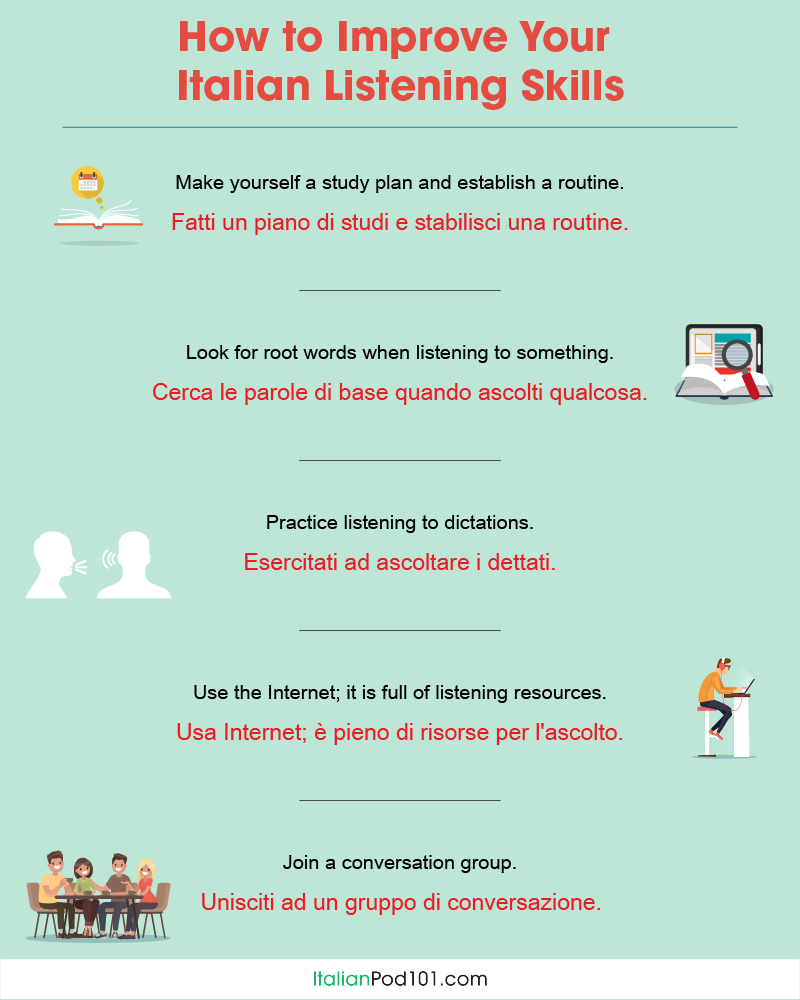
Pronouns are one of the fundamental bricks in the majestic building of grammar. Basically, what they do is replace another word, allowing us to avoid repetition and making every language more agile, pleasant, and poetic. Italian pronouns are no exception.
A pronoun in Italian can replace:
There are many kinds of Italian pronouns, categorized by their function in a sentence. In this Italian pronouns lesson here on ItalianPod101.com, we’ll show you a list of all the most important ones, with their definitions and examples of Italian pronoun usage. It’s Italian pronouns, made easy!
 Table of Contents
Table of Contents
- Italian personal pronouns
- Italian possessive pronouns
- Italian reflexive pronouns
- Italian demonstrative pronouns
- Italian interrogative and exclamatory pronouns
- Italian indefinite pronouns
- Italian relative pronouns
- ItalianPod101: Fast & Fun Italian for All
1- Italian personal pronouns

A personal pronoun is a word that indicates who or what is involved in a sentence, without having to repeat it in full. Let’s clarify with an example in English: “My daughter is on holiday. She’s very happy.” Without pronouns, we would say: “My daughter is on holiday. My daughter is very happy.” A bit annoying, isn’t it?
Now, there are two categories of Italian personal pronouns:
- Subject pronouns: When the replaced element is the subject of the sentence.
- Object pronouns: When the replaced element is the object of the sentence.
Further, there are two kinds of object pronouns.
- Direct object pronouns: When the pronoun replaces a direct object, answering the question “Who?” or “What?”
- Indirect object pronouns: When the pronoun replaces an indirect object, answering the question “To whom?” or “To what?”
Now, let’s see them in action in this nice and neat Italian pronouns table.
| Italian subject pronouns | Italian direct object pronouns | Italian indirect object pronouns | |
|---|---|---|---|
| 1st person singular | Io (“I”) | Mi (“Me”) | Mi (“To me”) |
| 2nd person singular | Tu (“You”) | Ti (“You”) | Ti (“To you”) |
| 3rd person singular | Informal: Lui, Lei (“He, She”). Formal: Egli, Ella, Esso, Essa (“He, She, It male, It female”) * | Lo (“Him, It male”), La (“Her, It female”), L’ (“Him, Her, It” whenever the following word begins with a vowel) | Gli (“To him, her, it”) |
| 1st person plural | Noi (“We”) | Ci (“Us”) | Ci (“To us”) |
| 2nd person plural | Voi (“You”) | Vi (“You”) | Vi (“To you”) |
| 3rd person plural | Informal: Loro (“They”). Formal: Essi, Esse (“They,” male and female) * | Li, Le (“Them,” male and female) | Gli, Loro (“To them”) |
| *Used in written, formal language, like in literature or official documents. | |||
And now, let’s dive into these Italian pronouns with examples!
Italian subject pronouns:
- Io
- Io vado al cinema, vuoi venire?
“I’m going to the cinema, do you want to come?”
- Tu
- Tu puoi andare ora.
“You can go now.”
- Lui
- Lui aveva fame ed è tornato a casa.
“He was hungry and has gone home.”
- Lei
- Lei, Marta, è davvero una persona interessante.
“She, Marta, really is an interesting person.”
- Noi
- Noi andremo in vacanza fra una settimana.
“We’ll go on holiday in one week.”
- Voi
- Voi avete guardato la partita ieri?
“Did you watch the match yesterday?”
- Loro
- Loro non sono qui perché non sono stati invitati.
“They are not here because they were not invited.”
Direct object pronouns:
- Mi
- Ieri Marco mi ha visto ma non mi ha salutato.
“Yesterday, Marco saw me but he didn’t say hello to me.”
- Ti
- Ti chiamerò domani per confermare l’accordo.
“I’ll call you tomorrow to confirm the deal.”
- Lo
- Cerco Giuliano, lo hai visto?
- “I’m looking for Giuliano, have you seen him?”
- La
- Ti piace la pasta? Io la adoro.
“Do you like pasta? I love it.”
- L’
- Il Barolo è buonissimo, l’ho assaggiato in Piemonte.
“Barolo is very good, I’ve tasted it in Piedmont.”
- Ci
- Lorenzo ci ha invitati al suo matrimonio.
“Lorenzo has invited us to his wedding.”
- Vi
- Martedì vi porto a cena in un ristorante buonissimo.
“Tuesday, I’ll bring you to dinner in a very good restaurant.”
- Li
- Li ho incontrati stamattina al supermercato.
“I bumped into them this morning at the supermarket.”
- Le
- A: Hai tu le mie scarpe bianche?
B: No, non le ho io.
A: “Do you have my white shoes?”
B: “No, I don’t have them.”
Indirect object pronouns:
- Mi
- Ieri Andrea mi ha dato una bellissima lettera.
“Yesterday, Andrea gave me a beautiful letter.”
- Ti
- Ho bisogno di parlarti.
“I need to talk to you.”
- Gli
- Gli ho consigliato di accettare il lavoro.
“I’ve suggested to him to accept the job.”
- Ci
- Roma ci piace così tanto che abbiamo deciso di vivere lì.
“We like Rome so much that we’ve decided to live there.”
- Vi
- Più tardi vi mando un’e-mail con i dettagli.
“Later, I’ll send you an email with the details.”
- Gli / Loro
- Gli ho detto che devono partire entro domani. / Ho detto loro che devono partire entro domani.
“I’ve told them that they must leave by tomorrow.”
Two important notes:
- Unlike in other languages, in Italian, the use of the subject pronoun in a sentence isn’t mandatory. In fact, the subject pronoun is usually omitted, except when it’s needed to avoid ambiguity.
- Sono andato a letto presto, perché ero stanco.
“(I) went to bed early, because (I) was tired.”
- In some cases, when you use an infinitive verb, you can add the object pronouns at the end of the sentence, attaching it to the infinitive verb.
- Vieni a trovarci questa estate?
“Are you coming to visit us this summer?”

2- Italian possessive pronouns
Italian possessive pronouns are identical to possessive adjectives. They replace the possessed object and must always be preceded by a definite article or a preposition + definite article. They’re conjugated according to gender and number.
They are:
- Mio / mia / miei / mie
- Adoro il tuo stereo. Il mio è vecchio.
“I love your stereo. Mine is old.”
- Tuo / tua / tuoi / tue
- Le mie nuove scarpe da trekking sono perfette. Come vanno le tue?
“My new trekking shoes are perfect. How are yours going?”
- Suo / sua / suoi / sue
- La mia valigia è stata finalmente trovata, ma della sua ancora non si sa nulla.
“My luggage was finally found, but we still don’t know anything about his.”
- Nostro / nostra / nostri / nostre
- Tuo figlio adora il basket, mentre i nostri preferiscono il calcio.
“Your son loves basketball, while ours prefers football.”
- Vostro / vostra / vostri / vostre
- Il mio cane è un pastore tedesco, e il vostro?
“My dog is a German shepherd, and yours?”
- Loro
- Il mio lavoro mi lascia molto tempo libero, mentre il loro no.
“My job gives me a lot of free time, while theirs does not.”

3- Italian reflexive pronouns
Reflexive pronouns are used when the subject of a sentence is also the object. There are a lot of very common reflexive verbs in Italian, and they can be a bit confusing. Anyway, the Italian reflexive pronouns are:
- Mi (“Myself”)
- Mi sto facendo la doccia.
“I’m taking a shower.”
- Ti (“Yourself”)
- Ti sei lavato le mani?
“Did you wash your hands?”
- Si (“Himself, Herself, Themselves”)
- Si è vestito in fretta ed è uscito.
“He dressed up quickly and got out.”
- Ci (“Ourself”)
- Io e Antonio ci amiamo molto.
“Antonio and I love each other very much.”
- Vi (“Yourself”, plural)
- Oggi vi siete svegliate molto presto, come mai?
“Today you got up very early, why?”
4- Italian demonstrative pronouns
Demonstrative pronouns are used instead of a noun to point out a specific person or thing. The most common Italian demonstrative pronouns are:
- Questo / questa / questi / queste (“This, these”)
- Questo è Luca, mio marito.
“This is Luca, my husband.”
- Quello / quella / quelli / quelle (“That, those”)
- Quelli che vedete sono i resti di un grande tempio romano.
“Those you see are the remains of a big Roman temple.”
5- Italian interrogative and exclamatory pronouns

Interrogative and exclamatory pronouns are used to form questions or exclamations. In Italian, they are:
- Chi (“Who”)
- Chi è l’uomo con cui parla Simone?
“Who is the man Simone is talking to?”
- Che cosa / Cosa / Che (“What”). All of these options are synonyms.
- Cos’è successo?
“What happened?”
- Quanto / quanta / quanti / quante (“How much” but also “So much” in exclamations)
- Quanto mi manchi!
“I miss you so much!”
- Quale / quali (“Which one”)
- Tra pizza e pasta, quale preferisci?
“Between pizza and pasta, which one do you prefer?”

6- Italian indefinite pronouns
Indefinite pronouns are used to indicate something or someone in general. The most common Italian indefinite pronouns are:
- Alcuno / alcuna / alcuni / alcune (“Some”)
- A: Ti sono piaciute le opere in mostra?
B: Alcune mi sono piaciute, ma non tutte.
A: “Did you like the artworks on display?”
B: “Some I liked, but not all of them.”
- Molto / molta / molti / molte (“Many, a lot”)
- A: Hai fame?
B: Molta!
A: “Are you hungry?”
B: “A lot!”
- Poco / poca / pochi / poche (“Few”)
- A: C’era molta gente al concerto?
B: No, poca.
A: “Were there many people at the concert?”
B: “No, not much.”
- Tanto / tanta / tanti / tante (“Many”)
- Tanti sono venuti alla manifestazione, nonostante il freddo.
“Many went to the demonstration, despite the cold.”
- Troppo / troppa / troppi / troppe (“Too much, too many”)
- Troppi non sono tornati dalla guerra.
“Too many didn’t come back from the war.”
- Tutto / tutta / tutti / tutte (“All, everyone”)
- Siamo arrivati tutti in ritardo.
“We’ve all arrived late.”
- Uno / una (“One”)
- A: Hai un cellulare?
B: Ne ho uno, ma è vecchio.
A: “Do you have a mobile phone?”
B: “I have one, but it’s old.”
- Qualcuno / qualcuna (“Someone, anyone”)
- Qualcuno sa dirmi dov’è Dario?
“Could anyone tell me where Dario is?”
- Ciascuno / ciascuna (“Everyone, each one”)
- Ciascuno di noi ha un compito.
“Each one of us has a task.”
- Ognuno / ognuna (“Everyone, each one”)
- Ognuno deve fare la sua parte.
“Everyone has to do their part.”
- Nessuno / nessuna (“No one, any”)
- Nessuno sa perché è successo.
“No one knows why it happened.”
- Sono andata a cercare funghi nel bosco, ma non ne ho trovato nessuno.
“I went looking for mushrooms in the forest, but I didn’t find any.”

7- Italian relative pronouns
Relative pronouns connect a sentence with a subordinate clause. The Italian relative pronouns are:
- Che (replaces a subject or direct object)
- La donna che sta parlando con Leo è il mio capo.
“The woman who is talking with Leo is my boss.”
- Chi (“The person who, the people who, whoever”)
- Chi è stato?
“Who did it?”
- Cui (replaces an indirect object)
- La ragazza di cui ti ho parlato sta entrando nella stanza proprio adesso.
“The girl I told you about is entering the room right now.”
- Il quale / la quale / i quali / le quali (same as Cui)
- La persona per la quale lavoro si chiama Mario Rossi.
“The person I work for is called Mario Rossi.”
8. ItalianPod101: Fast & Fun Italian for All

Mastering Italian pronouns is no easy feat, but with enough practice, you’ll get there! We hope you enjoyed this article and that you’re well on your way to really understanding Italian pronouns.
If there’s anything you didn’t quite understand, don’t hesitate to reach out in the comments. We’ll do our best to help you out!
Grammar is a complicated universe, but we at ItalianPod101 are here to help! Check out our lesson library and enjoy hours of videos, tons of useful articles, and practical mobile tools to learn and study whenever and wherever you want.
Happy Italian learning!










